- Home
- Linda Lael Miller
Moonfire Page 6
Moonfire Read online
Page 6
“Sincere” was too idealistic a word for the things this Yankee sprite made him feel, but it wasn’t without a certain legitimacy either. “I meant what I said,” he replied. And then, after an involuntary inspection of her person, he was compelled to ask, “Where the devil did you get that dress?”
Reeve watched, fascinated, as both relief and fierce pride played in her face. Before she could formulate a reply, the door burst open.
Philip Briggs, the nerveless little rotter, had the unmitigated brass to burst into the room, all bluster and blush, to caterwaul, “Good God, Maggie, what are you doing here?!”
Coolly, if somewhat unsteadily, Maggie Chamberlin rose to her feet. “I’m taking a part, Philip,” she said. “An even better one than you offered me.”
With uncharacteristic forcefulness Philip grabbed Maggie by the arm and dragged her out of the office, but not out of Reeve’s hearing. As he was shoving back his chair to follow, he heard Briggs make his confession.
“I never thought you would actually travel all the way to Australia, Maggie! The plain truth is, I could never be a good husband to you, and I don’t have the authority to give you any kind of part!”
There was a sharp sound, like a slap, and Reeve froze behind his desk, grinning. Listening.
“I don’t blame you for being angry,” Philip went on, more calmly now that he’d gotten his comeuppance. “But you’ve got to go home, Maggie—back to England, back to the States, anywhere. The theaters are only—only toys for Mr. McKenna’s mistress. Unless you’re prepared to assume that role, you have no hope of any others.”
Reeve’s grin faded. Why, that scrawny little pissant! By God, he’d feed Briggs ten of his own toes, with knees and ankles for good measure.
Cheeks hot, shoulders rigid, Maggie glared at Reeve as he stood in the doorway, pushed her way around him, and snatched up her reticule. He turned to face her. “Maggie—”
She drew back her arm and slammed the reticule into his middle as hard as she could. While Reeve was still doubled over, gasping for breath, Maggie Chamberlin squeezed past him and made what was probably the grandest exit of her career.
Chapter 4
HALF-BLINDED BY TEARS, TEARS SHE WAS STRUGGLING TO suppress, Maggie walked determinedly in the wrong direction for some distance and then had to retrace her steps. Finally, she stood before Number 20 George Street, which was a block away from Mr. McKenna’s offices and on the opposite side of the road. She stood outside for several minutes, drawing deep breaths and dashing at her wet eyes.
Mr. Kirk’s offices were on the first floor, and there were desks everywhere, telephones ringing, telegraph keys clicking, typewriters clattering. Maggie was, for a moment, intimidated by all that hectic activity, and she hesitated just inside the revolving door, wringing her hands.
She was not permitted to hesitate long, for a clerk immediately approached her, a fellow with a tight celluloid collar and spectacles. He didn’t smile, and there seemed to be a permanent flush in his cheeks. “Miss Chamberlin?”
Maggie, beginning now to regain her equanimity after that unfortunate scene at Mr. McKenna’s place of business, managed a slight smile and a nod.
The clerk took her arm with dispatch and half dragged her toward an inner office. “Mr. Kirk will see you now,” he said as Maggie hurried to keep up. She hardly had a chance to smooth her skirts and pray that her eyes weren’t swollen and red-rimmed before she was thrust into a plush chamber that looked more like a gentleman’s study than a place of business.
There were bookshelves filling every wall, except the one that was graced with an ornate ivory fireplace. Beside the impeccably neat desk, a massive piece of polished mahogany, a colorful globe spun on its tall, carved stand, aided by a graceful masculine hand.
The hand was connected, Maggie soon discerned, to a towering, well-built man with chestnut-colored hair and piercing green eyes. He wore a tailored suit of lightweight tweed, and when he smiled, she saw that his teeth were white and even.
“Miss Chamberlin,” he observed in a low and smooth voice. “Do come in and sit down.”
Hearing an American accent after all her time abroad was balm to Maggie’s spirit. She felt herself relaxing slightly, even though there was something about this man, as handsome as he was, that warned her to stay alert.
The clerk drew up a chair for Maggie, much as a waiter in a fine restaurant might have done, and she sat down gratefully. Her knees were wobbling and even though her eyes were dry, there were tears burning in her throat. The incident in Reeve McKenna’s office had taken a higher toll than she’d thought.
She started when the office doors closed with a genteel click behind her, and her prospective employer smiled at the reaction.
“My name is Duncan Kirk,” he said, slipping out of his costly tweed jacket and sitting down in the enormous leather chair behind his broad and quite intimidating desk. “I presume Lady Cosgrove explained my need to find a governess and companion for my sons?”
Maggie nodded. She had to forget that all her dreams had been dashed in the space of twenty-four hours and pull herself together. If she didn’t get this position, she would probably end up as a scullery maid. Or worse. “Yes, sir, she did.”
“I am a widower, Miss Chamberlin,” Mr. Kirk went on. “My sons are seven and ten years of age and I’m afraid they’ve suffered some for lack of a mother’s guidance. I, of course, am inordinately busy most of the time, and yet I hesitate to send the little scamps away to school, where they might have proper supervision as well as a first-rate education.”
Maggie was warming toward Mr. Kirk; his concern for his children touched her, as did the familiar pattern of his speech. “It’s very difficult for little people to be away from their homes and families,” she agreed, remembering her own years as an intermittent orphan. “Though that’s quite the custom in England, I’ve noticed.”
Mr. Kirk settled back in his chair, playing with a small silver ruler he’d taken from his desk. “How do you happen to be here in Australia, Miss Chamberlin?”
Maggie was tiring of that question, but she supposed it was a reasonable one. She explained once again about the circus, her parents’ accident, and her subsequent time in England. “How do you happen to be here, Mr. Kirk?” she blurted out once the story had been told.
Caught off guard, Mr. Kirk stared at Maggie for a moment and then laughed aloud. “You are refreshingly forthright, Miss Chamberlin. I came to Australia in the sixties with my father. He’d been, well—disillusioned, you might say—by the War Between the States. He bought mining shares, planning to strike gold. Instead, he found one of the largest opal deposits in the world.”
“Your story is certainly more spectacular than my own,” Maggie observed guilelessly.
Once again Mr. Kirk gave that disturbing, mellowed-brandy laugh. “I wonder,” he said cryptically when he’d recovered. Then, like quicksilver, the conversation changed course. “Have you any references, Miss Chamberlin?”
Maggie’s hopes of finding a place for herself began to fade. “No, sir—only those that were required for emigration to this country. I—I’ve never worked as a governess—”
Mr. Kirk looked alarmingly dour, the ruler propped under his square, clean-shaven chin. “I see. If you weren’t a governess, Miss Chamberlin, what were you?”
Maggie gulped, aware of the prejudice some people sustained against performers of any kind. “I was an actress, of sorts.”
There was a lengthy silence, during which Maggie could read absolutely nothing from Mr. Kirk’s expression, and then he asked, “Do you hope to return to that—profession?”
“No,” Maggie lied. She didn’t like misleading Mr. Kirk, but the plain fact was that her very survival could depend upon it. “I’m very well educated, sir—I can read and write and cipher as well as anyone—”
“Please stop calling me sir,” Mr. Kirk interrupted, somewhat brusquely. “I despise it.”
Maggie flushed and looked down at her c
lenched hands. She couldn’t seem to get anything right this morning.
Suddenly Mr. Kirk moved from his chair and strode across the room to one of the bookshelves. From a row of exquisite leatherbound volumes, he took a book and brought it back to Maggie, fairly thrusting it into her hands.
“Read a passage aloud, if you will,” he barked, turning his back and clasping his hands behind him to listen, much like a schoolmaster hearing a lesson.
Maggie smiled to see that the book was an old friend: Plato’s Republic. She read a full page without a single hesitation and snapped the volume closed. During the reading she’d felt a rising sense of triumph; the tide of the interview had turned in her favor and she knew it.
“If you’d like the position, it’s yours,” Mr. Kirk said, now perched on the edge of his desk, his arms folded, and gazing pensively at Maggie as though she were a riddle that he couldn’t quite solve.
“Thank you, Mr. Kirk. I’d like the position very much.”
“Excellent. Lady Cosgrove will send you around in one of her carriages, no doubt.”
Maggie nodded and rose awkwardly from her chair; Mr. Kirk was sitting so close that she feared brushing against him. It was a squeeze, but she managed to stand without the embarrassment of improper intimacy. The smile that quirked her new employer’s lips at her effort puzzled and unsettled her, and she hastened to take her leave.
Lady Cosgrove’s driver, left waiting far longer than he should have been, due to Maggie’s unofficial call on Mr. McKenna, was surly. “Took you long enough, that it did,” he snarled.
Maggie gave the driver a saucy look and opened the carriage door herself, since he hadn’t bothered to get down from the box and do it for her. Safely inside the luxurious vehicle, she thought of that spineless Philip Briggs and then of the equally impossible Mr. Reeve McKenna, and decided that she detested them both.
Reeve was in a foul mood; Loretta could see that even from a distance. She stepped back from the parlor window, with its splendid view of Rushcutter’s Bay, and turned all her attention on little Elisabeth, who sat upon the cool bricks of the hearth, absorbed, as always, in her drawing.
The child was an enigma to Loretta, beautiful with her dark, dark hair and her uncle’s aquamarine eyes. At four, Elisabeth McKenna possessed an uncanny ability to transcribe real life to a series of lines and shadows on paper, but for all that she rarely spoke, except to say “Papa” on occasion.
Reeve had taken the child from doctor to doctor, seeking a cure for his niece as doggedly as he sought his lost brother, Jamie, who had been transported a full twenty years before. There had been no success on either front: The doctors said that there was nothing medically wrong with Elisabeth, that she’d probably suffered some trauma they’d never know about, when her mother abandoned her. As for Jamie McKenna, the best detectives in all of Australia hadn’t been able to turn up a trace of him—except for his cast-off child, of course—though they went right on collecting their outrageous fees.
As far as Loretta was concerned, both enterprises were a waste of time as well as money. If Elisabeth delighted in being difficult, so be it. The little scamp needn’t think it was any skin off Loretta’s nose. And when it came to Jamie, he was probably a ne’er-do-well—if he was alive at all. He hadn’t been able to look after his own daughter, in any case. Elisabeth had been found in an orphanage.
The front door opened and Elisabeth’s whole countenance was suddenly aglow. She shuffled her everlasting sketchbook and pencils aside and scrambled to her feet, bounding into the entry hall with a cry of glee.
Moments later Reeve came in, carrying Elisabeth in one arm and grinning like the besotted fool he was—when it came to that child. On catching sight of Loretta, his jawline tightened and the smile was gone. Gently, he asked Elisabeth to go and see if Cook was making pie for dinner as promised, and let the child down to the floor.
To Loretta’s well-hidden annoyance, Elisabeth raced off to do his bidding.
Loretta decided that the best defense was an offense and asked sweetly, “Am I to assume that your little arrangement with that American girl was nipped in the bud before it could bloom?”
Reeve’s face suddenly lost all color and his eyes were hot with anger, searing Loretta’s flesh wherever they touched. She turned away to pour brandy for him and for herself, inwardly bracing herself against his fury.
“I wasn’t planning to install Maggie in a gilded cage and have my way with her, Loretta. I merely wanted to make sure that she would be looked after.”
The chilly calm in Reeve’s voice found its way into Loretta’s ramrod-straight backbone and caused her to shiver. All the same, she was smiling brightly when she turned around, a crystal snifter of brandy in each hand. “So it’s ’Maggie’ now, is it?” She extended one of the snifters to Reeve and he slapped it out of her hand, sending it shattering against the face of the fireplace. Loretta retreated a step, taking a healthy sip of her brandy to steady herself and then going boldly on. “Did Philip get there in time to spoil everything? How terrible for you if he did.”
“So you did send him.” The words Reeve spoke were cold as ice, and yet they scalded.
“It was nothing any other jealous mistress wouldn’t have done. Can you honestly blame me for trying to protect my interests?”
For a moment Reeve looked as though he might strike her, something he had never, even in the hottest anger, done before. He raised his hand, then withdrew it, ran it through his hair, and turned away.
“I spoke with Lady Cosgrove a few minutes ago,” he said evenly, after a long and ragged silence. “Do you know where Maggie is, Loretta?”
Loretta took another sip of brandy and shrugged. “How could I know, darling?” she countered. She was not the cool and composed woman she seemed; she was playing a part.
“She’s taken a post in Duncan Kirk’s house,” Reeve answered, turning around now, folding his arms and resting his broad back against the mantelpiece. “She’s a governess.”
Loretta could no longer maintain her facade; she was on dangerous ground now, for Reeve hated Duncan Kirk as he’d never hated another person. The fact that Duncan had inadvertently scored a triumph by taking a woman Reeve wanted into his household would compound Loretta’s offense. She allowed a tear to slip down her face.
“Good Lord, Reeve, if you’re so bent on having the chit, go over to Duncan’s house and collect her! Have your little affaire d’amour—you know I’ll have no choice but to forgive you!”
Reeve advanced on Loretta suddenly, taking a hard grasp on her chin, forcing her to meet his snapping gaze. “You know what kind of man Duncan Kirk is,” he said in a dangerous hiss, “and you know what he’ll do to her! Damn it, woman, don’t you have a soul?”
“If he seduces her,” Loretta spat out, “he certainly won’t be the first! Your precious Maggie belonged to Philip Briggs before you knew her, remember!”
Reeve released Loretta so forcefully that she nearly lost her footing. He moved past her, to pour a double shot of rum into a glass and, between swallows, he chuckled. The sound was raw and frightening and Loretta edged away, out of reach.
Finally, he whirled on her, the fiery blue of his eyes warning of his rage even before he spoke. “That will be enough, Loretta. Quite enough.”
“Why?” Loretta spouted, wondering at her daring. “Because you can’t bear to think of pretty Philip putting his soft hands on her?”
Reeve tossed back the last of his rum before answering with a cutting, “When it comes to women, it’s more than Philip’s hands that’s soft, and you know it as well as I do, Loretta.”
The flimsy hope that Reeve might not have considered Philip’s personal foible collapsed under his words. She gave a long sigh and searched her mind for something to say that would make Reeve care for her again. Only for her.
“I love you,” she said.
“Please,” was the caustic reply.
Loretta’s voice was shaking and this time her tears were no
artifice; they were real. “What do you want of me, Reeve? Just tell me what you want and I’ll—”
“I want you to leave.”
Loretta’s glass fell to the carpet with a thunk. “What?”
“I said, I want you to leave. I’ll provide for you, of course—you can have the theaters and my solicitor will draw up some kind of agreement for your support, but I want you out of this house, Loretta. Now. Tonight.”
“Reeve!” Loretta was standing before him now, clutching at his muscular arms. “In the name of heaven, don’t do this! If you want that—that woman, then have her! I’ll be waiting when you tire of her, I swear it!”
Something very much like disgust moved onto Reeve’s face, sobering Loretta, allowing her to get a hold on her dignity.
“This isn’t about Maggie, Loretta. It’s me, it’s you—” He paused, sighed. “It’s over.”
“No!”
Reeve gently freed his arms from her grasp and stepped away, turning his back.
Loretta could see by the set of his shoulders that he was waiting for something, braced for something she might say. But what was there to say? She’d tried begging, and it hadn’t worked. She’d tried tears and sarcasm with an equal lack of success. What in the name of God did Reeve want of her?
All Loretta had to offer was the venom of a woman scorned. “I’ll see you on your knees for this, Reeve McKenna. And rest assured, sweet Maggie will suffer too. You have my word on that!”
Reeve sighed heavily. “No threats, Loretta. I’m not without a measure of power myself, remember.”
Loretta shivered, even though the night was warm. Out of the corner of her eye she saw Elisabeth cowering in a doorway, taking in the scene with an aquamarine stare.
“You’ll continue to look after the child, of course,” Loretta said stiffly, and Reeve turned to face her with something like contempt moving in his features.

 Angelfire
Angelfire Moonfire
Moonfire The Yankee Widow
The Yankee Widow The Cowboy Way
The Cowboy Way Country Strong--A Novel
Country Strong--A Novel Forever and a Day
Forever and a Day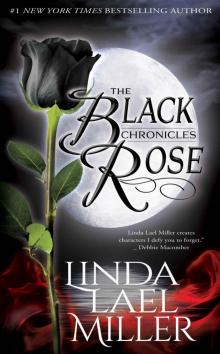 The Black Rose Chronicles
The Black Rose Chronicles Montana Creeds: Logan
Montana Creeds: Logan My Darling Melissa
My Darling Melissa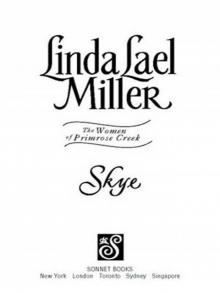 Skye
Skye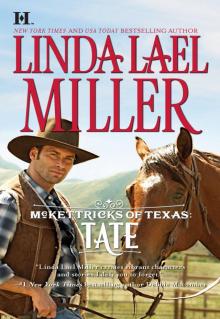 McKettricks of Texas: Tate
McKettricks of Texas: Tate Springwater Seasons
Springwater Seasons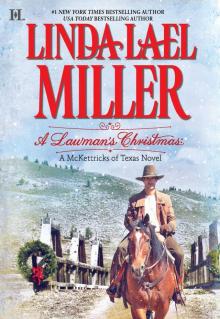 A Lawman's Christmas
A Lawman's Christmas Sierra's Homecoming
Sierra's Homecoming![Parable, Montana [4] Big Sky Summer Read online](http://i1.bookreadfree.com/i/03/22/parable_montana_4_big_sky_summer_preview.jpg) Parable, Montana [4] Big Sky Summer
Parable, Montana [4] Big Sky Summer One Last Weekend
One Last Weekend A Stone Creek Collection, Volume 2
A Stone Creek Collection, Volume 2 Tonight and Always
Tonight and Always Fletcher's Woman
Fletcher's Woman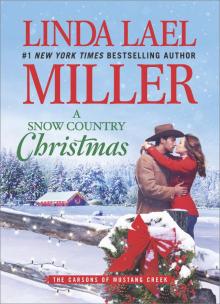 A Snow Country Christmas
A Snow Country Christmas The Last Chance Cafe
The Last Chance Cafe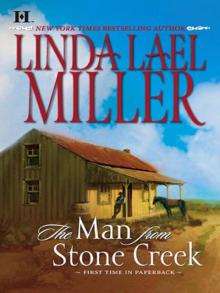 The Man from Stone Creek
The Man from Stone Creek Wanton Angel
Wanton Angel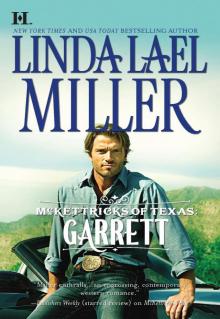 McKettricks of Texas: Garrett
McKettricks of Texas: Garrett Memory's Embrace
Memory's Embrace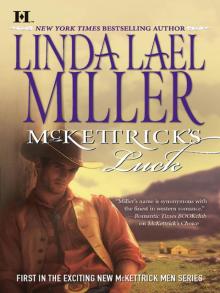 McKettrick's Luck
McKettrick's Luck Pirates
Pirates Big Sky River
Big Sky River Willow: A Novel (No Series)
Willow: A Novel (No Series) The McKettrick Legend: Sierra's HomecomingThe McKettrick Way (Hqn)
The McKettrick Legend: Sierra's HomecomingThe McKettrick Way (Hqn) Glory, Glory: Snowbound with the Bodyguard
Glory, Glory: Snowbound with the Bodyguard Two Brothers
Two Brothers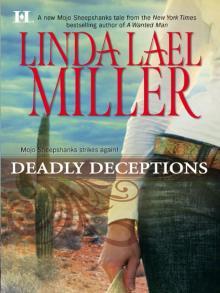 Deadly Deceptions
Deadly Deceptions Big Sky Secrets
Big Sky Secrets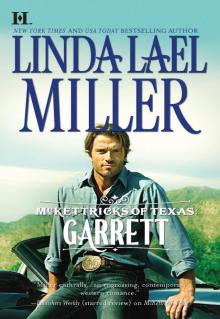 Garrett
Garrett A Creed in Stone Creek
A Creed in Stone Creek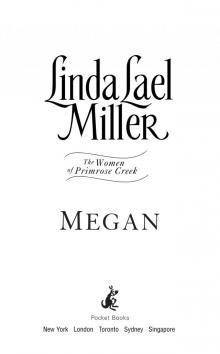 Megan
Megan McKettricks of Texas: Austin
McKettricks of Texas: Austin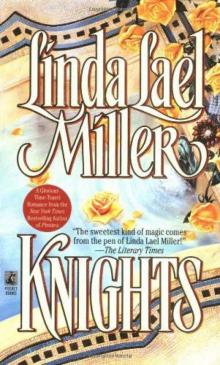 Knights
Knights High Country Bride
High Country Bride More Than Words Volume 4
More Than Words Volume 4 Glory, Glory
Glory, Glory Daring Moves
Daring Moves Lily and the Major
Lily and the Major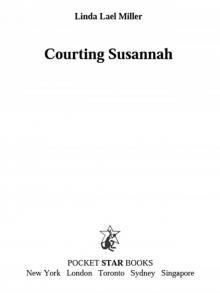 Courting Susannah
Courting Susannah Banner O'Brien
Banner O'Brien Big Sky Mountain
Big Sky Mountain Linda Lael Miller Bundle
Linda Lael Miller Bundle McKettrick's Pride
McKettrick's Pride A Stone Creek Collection Volume 1
A Stone Creek Collection Volume 1 A Wanted Man
A Wanted Man Big Sky Country
Big Sky Country The McKettrick Legend
The McKettrick Legend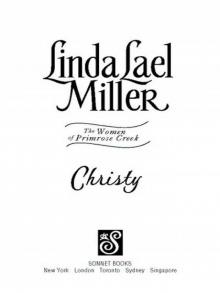 Christy
Christy McKettrick's Heart
McKettrick's Heart Resurrection
Resurrection Arizona Heat
Arizona Heat Secondhand Bride
Secondhand Bride Snowflakes on the Sea
Snowflakes on the Sea Montana Creeds: Tyler
Montana Creeds: Tyler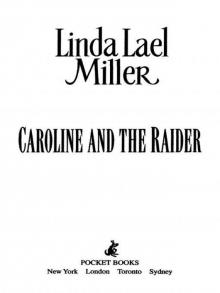 CAROLINE AND THE RAIDER
CAROLINE AND THE RAIDER A Proposal for Christmas: State SecretsThe Five Days of Christmas
A Proposal for Christmas: State SecretsThe Five Days of Christmas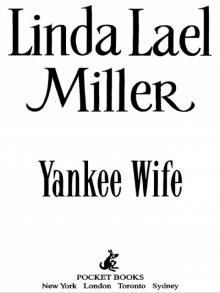 Yankee Wife
Yankee Wife Linda Lael Miller Montana Creeds Series Volume 1: Montana Creeds: LoganMontana Creeds: DylanMontana Creeds: Tyler
Linda Lael Miller Montana Creeds Series Volume 1: Montana Creeds: LoganMontana Creeds: DylanMontana Creeds: Tyler The Christmas Brides
The Christmas Brides McKettricks Bundle
McKettricks Bundle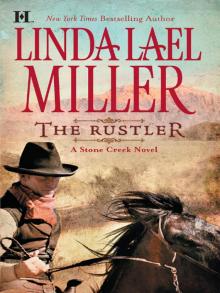 The Rustler
The Rustler Here and Then
Here and Then Only Forever
Only Forever Once a Rancher
Once a Rancher The 24 Days of Christmas
The 24 Days of Christmas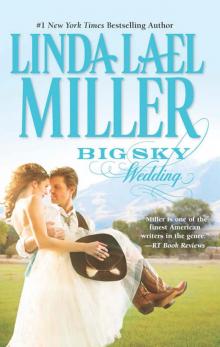 Big Sky Wedding
Big Sky Wedding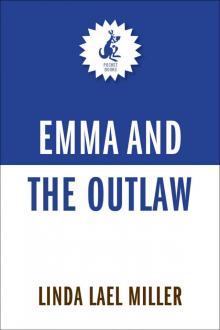 Emma and the Outlaw
Emma and the Outlaw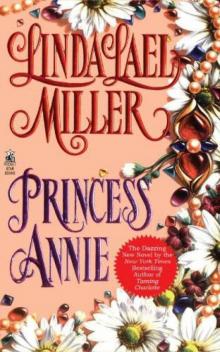 Princess Annie
Princess Annie Wild About Harry
Wild About Harry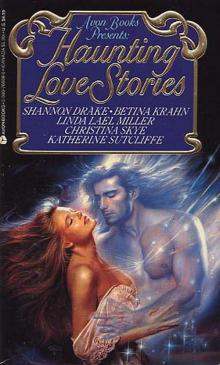 That Other Katherine
That Other Katherine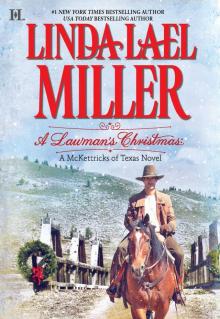 A Lawman's Christmas: A McKettricks of Texas Novel
A Lawman's Christmas: A McKettricks of Texas Novel Just Kate: His Only Wife (Bestselling Author Collection)
Just Kate: His Only Wife (Bestselling Author Collection)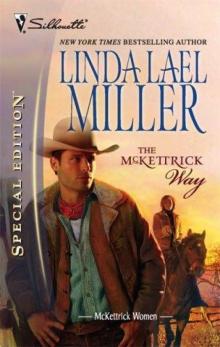 The McKettrick Way
The McKettrick Way Part of the Bargain
Part of the Bargain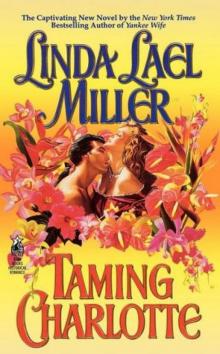 Taming Charlotte
Taming Charlotte Holiday in Stone Creek
Holiday in Stone Creek One Last Look
One Last Look Always a Cowboy
Always a Cowboy Batteries Not Required
Batteries Not Required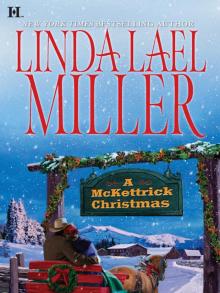 A McKettrick Christmas
A McKettrick Christmas For All Eternity
For All Eternity The Marriage Season
The Marriage Season Corbin's Fancy
Corbin's Fancy The Creed Legacy
The Creed Legacy Springwater Wedding
Springwater Wedding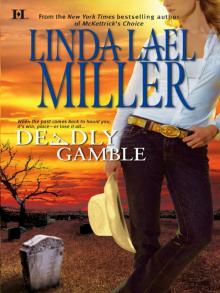 Deadly Gamble
Deadly Gamble Austin
Austin Creed's Honor
Creed's Honor A Creed Country Christmas
A Creed Country Christmas Escape from Cabriz
Escape from Cabriz There and Now
There and Now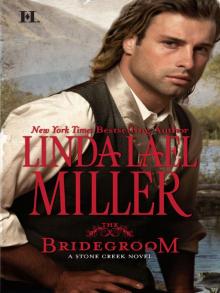 The Bridegroom
The Bridegroom State Secrets
State Secrets Bridget
Bridget